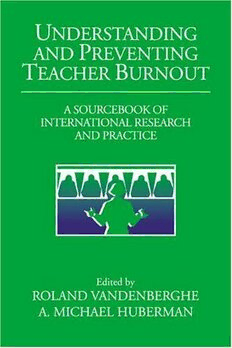Download Understanding and Preventing Teacher Burnout: A Sourcebook of International Research and Practice PDF Free - Full Version
Download Understanding and Preventing Teacher Burnout: A Sourcebook of International Research and Practice by Roland Vandenberghe, A. Michael Huberman in PDF format completely FREE. No registration required, no payment needed. Get instant access to this valuable resource on PDFdrive.to!
About Understanding and Preventing Teacher Burnout: A Sourcebook of International Research and Practice
''Burnout'' was first investigated in the 1970s as a crisis of overextended and disillusioned social service workers. However, as the nature of these workers' jobs has changed, so has the nature of the syndrome. The current experience of burnout is lived out in a more challenging social context, with social service workers struggling harder for social credibility and job security. For instance, because of greater demands on their time and energy, teachers are being pressed to do more work with fewer resources, while receiving fewer rewards and less recognition of their efforts. The objective of this volume is to provide new perspectives and a deeper understanding of the nature, conditions, and consequences of burnout, most notably in the teaching profession. To do this, the contributors review the most recent research in the field, and describe research and action agendas designed to combat the incidence of burnout in the workplace. Researchers and professionals in the fields of education and social psychology will be particularly interested in what this volume has to offer.
Detailed Information
| Author: | Roland Vandenberghe, A. Michael Huberman |
|---|---|
| Publication Year: | 1999 |
| ISBN: | 9780511527784 |
| Pages: | 380 |
| Language: | English |
| File Size: | 5.957 |
| Format: | |
| Price: | FREE |
Safe & Secure Download - No registration required
Why Choose PDFdrive for Your Free Understanding and Preventing Teacher Burnout: A Sourcebook of International Research and Practice Download?
- 100% Free: No hidden fees or subscriptions required for one book every day.
- No Registration: Immediate access is available without creating accounts for one book every day.
- Safe and Secure: Clean downloads without malware or viruses
- Multiple Formats: PDF, MOBI, Mpub,... optimized for all devices
- Educational Resource: Supporting knowledge sharing and learning
Frequently Asked Questions
Is it really free to download Understanding and Preventing Teacher Burnout: A Sourcebook of International Research and Practice PDF?
Yes, on https://PDFdrive.to you can download Understanding and Preventing Teacher Burnout: A Sourcebook of International Research and Practice by Roland Vandenberghe, A. Michael Huberman completely free. We don't require any payment, subscription, or registration to access this PDF file. For 3 books every day.
How can I read Understanding and Preventing Teacher Burnout: A Sourcebook of International Research and Practice on my mobile device?
After downloading Understanding and Preventing Teacher Burnout: A Sourcebook of International Research and Practice PDF, you can open it with any PDF reader app on your phone or tablet. We recommend using Adobe Acrobat Reader, Apple Books, or Google Play Books for the best reading experience.
Is this the full version of Understanding and Preventing Teacher Burnout: A Sourcebook of International Research and Practice?
Yes, this is the complete PDF version of Understanding and Preventing Teacher Burnout: A Sourcebook of International Research and Practice by Roland Vandenberghe, A. Michael Huberman. You will be able to read the entire content as in the printed version without missing any pages.
Is it legal to download Understanding and Preventing Teacher Burnout: A Sourcebook of International Research and Practice PDF for free?
https://PDFdrive.to provides links to free educational resources available online. We do not store any files on our servers. Please be aware of copyright laws in your country before downloading.
The materials shared are intended for research, educational, and personal use in accordance with fair use principles.

